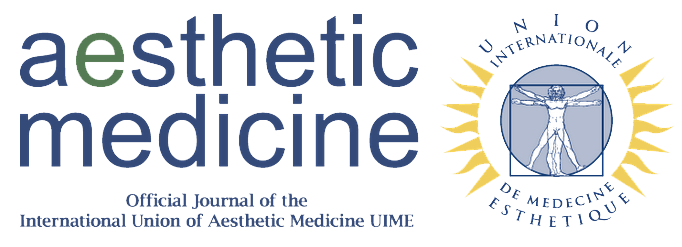The role of onco-aesthetic in breast cancer: a clinical report study
Keywords:
Aesthetic Medicine, antiaging, onco-aesthetic, self-esteem, deep hydrationAbstract
Background: Cancer, particularly breast cancer, may be associated with a premature aging phenotype. Breast cancer patients have increased risk for depressive syndrome, anxiety disorders and low self-esteem. Aesthetic medicine procedures, particularly regarding facial rejuvenation, have been used in breast cancer survivors showing to be safe and effective, as well as important factors to increase cancer patients quality of life.
Aims: To evaluate the impact of a hyaluronic acid (HA) hydration protocol on the skin properties and characteristics, reduction of fine lines, wrinkles, and acne scars of a breast cancer patient under active surveillance. To determine the impact of the results achieved on the patient's self-esteem.
Methods: The developed HA hydration protocol included four fortnightly sessions and two subsequent monthly sessions. In each session, 3 mL of NCTF® 135 HA was injected in papillary dermis, on the middle and lower third of the face, through cannula vectorization; prior treatment photographs were taken; and a skin evaluation by Multi Skin Test Center MC 900® was made. The Rosenberg Self-Esteem Scale was applied at the beginning and at the end of the study.
Results: Data revealed an increase of skin hydration (+41%) and of elasticity (+28%); an increase of skin homogeneity, reducing fine lines, wrinkles, and acne scars. Rosenberg Self-Esteem Scale showed equal pre- and post-protocol scores.
Discussion: Breast cancer patients under active surveillance can benefit from aesthetic medicine procedures; cannula vectorization may be an alternative to juxta-periosteal procedures. The developed HA hydration protocol demonstrated to improve skin properties and characteristics, increasing skin hydration and elasticity, reducing signs of skin aging, restoring luminosity and homogeneity to the skin. Self-esteem assessment can be a useful tool to evaluate the impact of aesthetic procedures on mental health, particularly in onco-aesthetic.
References
Krueger N, Luebberding S, Sattler G, et al. The history of aesthetic medicine and surgery. J Drugs Dermatol. 2013; 12(7):737-742.
Lima A, Castro AF, Ayoub R. Emerging goals of aesthetical medicine in hiperpgimentary skin: an oncological perspective. Aesthet Med. 2020; 6(1):39-48.
Dayan S. Emerging Goals in Aesthetic Medicine. JAMA Facial Plast Surg. 2017; 19(5):367-368.
Costa DS, Mercieca-Bebber R, Rutherford C, Gabb L, King MT. The impact of cancer on psychological and social outcomes. Australian Psychologist. 2016; 51(2):89-99.
Guida JL, Ahles TA, Belsky D, et al. Measuring aging and identifying aging phenotypes in cancer survivors. J Natl Cancer Inst. 2019; 111(12):1245-1254.
Zielonke N, Kregting LM, Heijnsdijk EAM, et al. The potential of breast cancer screening in Europe. Int J Cancer. 2021; 148(2):406-418.
Chang L, Weiner LS, Hartman SH, et al. Breast cancer treatment and its effects on aging. J Geriatr Oncol. 2019; 10(2):346-355.
Sanoff HK, Deal AM, Krishnamurthy J, et al. Effect of cytotoxic chemotherapy on markers of molecular age in patients with breast cancer. J Natl Cancer Inst. 2014; 106(4):1-8.
Tobin DJ. Introduction to skin aging. J Tissue Viability. 2017; 26(1):37-46.
Mokos ZB, Curkovic D, Kostovic K, Ceovic R. Facial changes in the mature patient. Clin Dermatol. 2018; 36(2):152-158.
Thomas DR, Burkemper NM. Aging skin and wound healing. Clin Geriatr Med. 2013; 29(2):xi-xx.
Levine JM. Clinical aspects of aging skin: considerations for the wound care practitioner. Adv Skin Wound Care. 2020; 33(1):12-19.
Thornton MJ. Estrogens and aging skin. Dermatoendocrinol. 2013; 5(2):264-270.
Yektatalab S, Ghanbari E. The relationship between anxiety and self‐esteem in women suffering from breast cancer. J Midlife Health. 2020; 11(3):126-132.
Carver CS, Smith RG, Petronis VM, Antoni MH. Quality of life among long-term survivors of breast cancer: different types of antecedents predict different classes of outcomes. Psychooncology. 2006; 15(9):749–758.
Shamban A. Safety and efficacy of facial rejuvenation with small gel particle hyaluronic acid with lidocaine and abobotulinumtoxin A in post-chemotherapy patients: a phase IV investigator-initiated study. J Clin Aesthet Dermatol. 2014; 7(1):31-36.
Tan A, Argenta P, Ramirez R, Bliss R, Geller M. The use of sodium hyaluronate-carboxymethylcellulose (HA-CMC) barrier in gynecologic malignancies: a retrospective review of outcomes. Ann Surg Oncol. 2009; 16(2):499-505.
Wu M, Cao M, He Y, et al. A novel role of low molecular weight hyaluronan in breast cancer metastasis. FASEB J. 2015; 29(4):1290-8.
Downloads
Published
Issue
Section
License
Copyright (c) 2023 Tiago Gomes de Oliveira, Áurea Lima

This work is licensed under a Creative Commons Attribution-NonCommercial 4.0 International License.
This is an Open Access article distributed under the terms of the Creative Commons Attribution License (https://creativecommons.org/licenses/by-nc/4.0) which permits unrestricted use, distribution, and reproduction in any medium, provided the original work is properly cited.
Transfer of Copyright and Permission to Reproduce Parts of Published Papers.
Authors retain the copyright for their published work. No formal permission will be required to reproduce parts (tables or illustrations) of published papers, provided the source is quoted appropriately and reproduction has no commercial intent. Reproductions with commercial intent will require written permission and payment of royalties.

This work is licensed under a Creative Commons Attribution-NonCommercial 4.0 International License.





